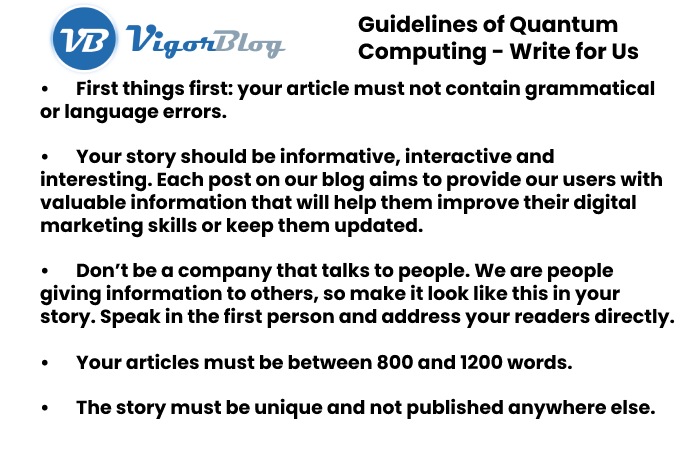Quantum Computing Write for Us

Quantum Computing Write for Us – If you want to write Quantum Computing blogs, Vigorblog allows for creating the content. We seek a capable and enthusiastic article and blog writer who enjoys writing in the Quantum Computing niche. Our platform is an excellent opportunity to expose your expertise on your preferred Quantum Computing topic. Share your advice and experience by utilizing Vigorblog Write For Us.
We appreciate the value bloggers, content writers, and digital marketers bring to our website with their well-researched and quality content. If you are searching for a quantum computing resource to share your opinion and expertise, there is none better than Vigorblog.
We will consider guest post offers related to Health, Diet, Skin, Products, Beauty, and Technology. If you’d like to submit an article, please email contact@vigorblog.com
What is Quantum Computing?
This branch of computer science is built on the ideas of quantum superposition and entanglement and uses a different computation method than the usual one. Theoretically, it could store many more states per unit of information and use much more efficient numerical methods, such as Shor’s or quantum annealing.
To overcome the limitations of traditional computing, this new generation of supercomputers employs an understanding of quantum mechanics — the branch of science that analyses atomic and subatomic particles. Although quantum computing has obvious scalability and incoherence issues in practice, it allows for several simultaneous operations and eliminates the tunnel effect, which limits present nanometric scale programming.
What Are The Principles Of Quantum Computing?
To understand quantum principles properly, a new dictionary of terms, such as superposition, entanglement, and decoherence. Quantum principles use to operate a quantum computer. Let’s look at these principles in more detail below.
Superposition
Superposition states that you can combine two or more quantum states to produce another valid quantum state, similar to waves in classical physics. Every quantum state can alternatively represent a sum of two or more different unique states. This qubit superposition gives quantum computers their intrinsic parallelism, allowing them to conduct millions of operations at the same time.
Entanglement
Quantum entanglement happens when two systems so closely link that knowledge of one provides an immediate understanding of the other, regardless of how far apart they are. Quantum processors can infer information about one particle by measuring another. They can, for example, decide that if one qubit spins up, the other will always spin down, and vice versa. Because of quantum entanglement, quantum computers can answer complicated problems more quickly.
When you measure a quantum state, the wave function collapses, and you get either a zero or a one. The qubit functions as a classical bit in this known or predictable condition. Entanglement refers to qubits’ capacity to associate their states with other qubits.
Decoherence
Decoherence is the loss of a qubit’s quantum state. Environmental factors, like radiation, can cause the qubits’ quantum states to collapse. Designing the numerous characteristics that seek to postpone state decoherence, such as building specialty structures that hide the qubits from external fields, is a significant engineering difficulty in constructing a quantum computer.
What Is The Quantum Computing Advantage?
No quantum computer can complete a useful task faster., cheaper, or more efficiently than a traditional computer. The quantum advantage is the point at which we have developed a quantum system that can do tasks that even the best classical computer cannot emulate in any reasonable time.
Guidelines of the Article – Quantum Computing Write for Us
 You can send your article to contact@vigorblog.com
You can send your article to contact@vigorblog.com
